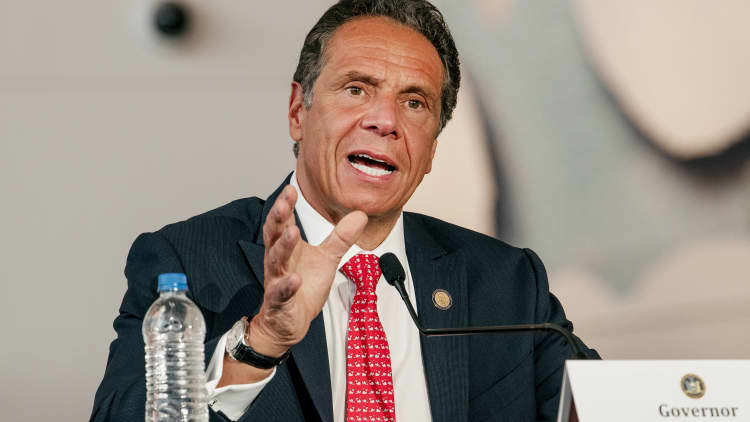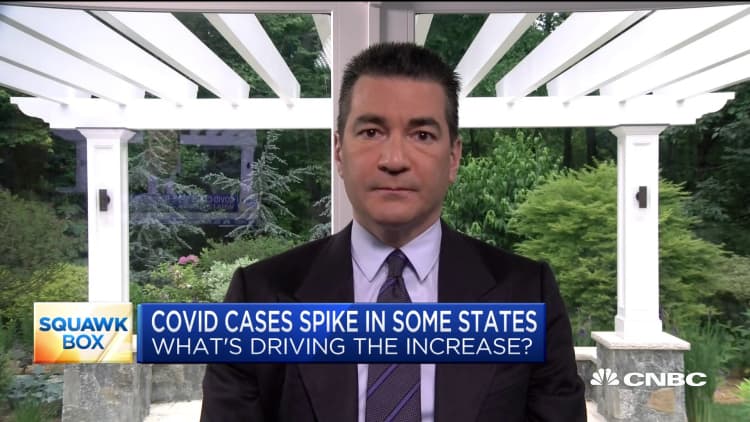
New York will allow five central and upstate regions to move to phase three of reopening on Friday, permitting restaurants to reopen for indoor dining as well as other businesses, Gov. Andrew Cuomo announced Thursday.
The news comes as the coronavirus continues to spread more rapidly in some states that were among the first and most aggressive to reopen, such as Texas and Arizona. New York has continued to see a decline in new cases as the state gradually reopens.
"We've had the most science-based, the most informed reopening, I think it's fair to say, in the country," Cuomo said at a news briefing. "It is nothing about intuition, nothing about politics. Look at the numbers. Follow the numbers."
As of Wednesday, there were 2,042 total Covid-19 hospitalizations in the state, Cuomo said, the lowest since March 21. He added that 36 people died of the disease on June 10, down from the state's peak of nearly 800 fatalities per day in mid-April.
The five regions moving into phase three of reopening on Friday are: North Country, Mohawk Valley, Southern Tier, Finger Lakes and Central New York. Cuomo said a team of "global experts" went through the data, including hospitalization rate, intensive care capacity, testing capacity and other indicators, to make the decision.
Under phase three guidelines, restaurants can open for indoor dining at 50% capacity along with some other modifications meant to reduce the risk of spread. Personal care facilities such as tattoo parlors, nail salons and spas can reopen as well, also with capacity limited to 50% and other restrictions.
Cuomo urged business owners to abide by the state regulations, adding that "you can lose your right to operate" if a business is found to be violating the state's requirements.
"I know businesses are anxious to open. Everybody is anxious to get the economy going. Please follow the guidelines and do what is permissible to do," Cuomo said. "Covid is still out there."
The decision on whether to reopen public swimming pools and playgrounds will be left to local officials, he added.
While the spread of the virus has continued to decline in New York, it has spiked elsewhere. Cuomo pointed to an array of other states that have recently seen an uptick in cases or hospitalizations since they began to reopen. He said 21 states have seen an increase, and 14 have reported record high numbers of daily new coronavirus cases.
"We are the exception. To date, we are the exception. And that can change and that can change overnight," he said. "It's the same story. 'We want to reopen, we want to reopen. It's fine, it's fine, it's fine.' No, it's fine until it's not fine."
Public officials are watching for a potential rise in cases following massive protests over George Floyd's killing and systemic racism. Cuomo said the state might see an uptick in infections in a couple of weeks related to the protests and increased movement due to the state's reopening.
The key, he said, will be to track new infections back to the source so health officials can identify and isolate people who might be infected. He said the hope is that by gradually reopening parts of the state, New York can avoid another outbreak such as those now seen elsewhere.
Texas, which began to reopen on May 8 and expanded its reopening on May 18, reported Thursday that it has 2,008 Covid-19 patients currently in hospitals, a drop from the state's all-time high of 2,153 on Wednesday.
Hospitalization numbers better reflect a state's reopening performance since it's more difficult to skew than the number of confirmed cases, which fluctuates depending on how many tests are being run.
The outbreak also appears to be expanding in Arizona, which began to reopen in mid-May. The Arizona Republic reported Monday that the state health director sent a letter on June 6 to hospitals asking them to "fully activate" their emergency plans to ensure they continue to have adequate capacity. Arizona's largest health-care system, Banner Health, told CNBC on Monday that its number of Covid-19 patients on ventilators has quadrupled since May 15.
North Carolina, which began to reopen on May 8 and expanded its reopening on May 22, reported Thursday that a record number of Covid-19 patients, 812, are in hospitals across the state.
"Our hospital members are attributing the recent increase mainly to people moving about more after restrictions were relaxed and the state moved into phase 2 of reopening and then again after Memorial Day weekend," Cynthia Charles, spokeswoman for the North Carolina Healthcare Association, said Wednesday in a statement to CNBC.
Former Food and Drug Administration Commissioner Dr. Scott Gottlieb told CNBC earlier Thursday that spread in such states appears to be "more pervasive." He added that the surge is not quite a "second wave" because many of these states "never really got rid of the first wave."
"I think we should be concerned," he said on CNBC's "Squawk Box." "The more concerning part is they haven't been able to isolate what the source of the infection is."
Disclosure: Scott Gottlieb is a CNBC contributor and is a member of the boards of Pfizer and biotech company Illumina.





